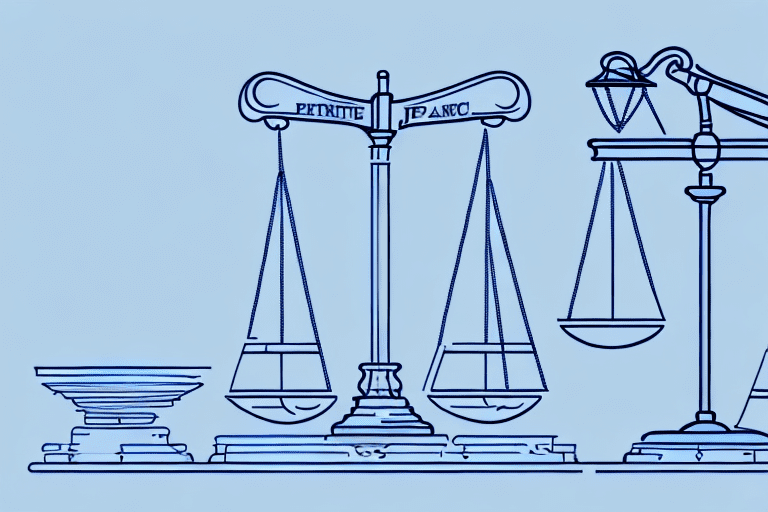A patent bar class is a specialized training program designed to prepare individuals for the United States Patent and Trademark Office (USPTO) patent bar examination. This examination is a requirement to become a registered patent attorney or patent agent.
Understanding the Concept of a Patent Bar Class
A patent bar class is an intensive educational course aimed at equipping individuals with the necessary knowledge and skills to pass the patent bar examination. The purpose of this class is to provide a comprehensive understanding of patent law, patent office procedures, and patent examination practice. It covers a wide range of topics crucial for practicing in the field of patent law.
During a patent bar class, students delve into the intricacies of patent law, learning about the various types of patents, including utility patents, design patents, and plant patents. They explore the requirements for patentability, such as novelty, non-obviousness, and utility. In addition, students gain a deep understanding of the patent application process, including drafting patent claims, preparing patent drawings, and filing patent applications.
One of the key aspects of a patent bar class is the examination of patent office procedures. Students learn about the inner workings of the United States Patent and Trademark Office (USPTO), understanding how patent applications are reviewed, examined, and granted. They become familiar with the rules and regulations governing patent prosecution, including the interaction between patent examiners and patent practitioners.
Moreover, a patent bar class provides students with practical knowledge and skills related to patent examination practice. They learn how to conduct patent searches and analyze prior art to determine the patentability of an invention. Students also gain insights into the strategies and techniques employed in responding to office actions and overcoming rejections.
The Importance of Patent Bar Classes
Patent bar classes play a critical role in the development of aspiring patent attorneys and patent agents. They offer in-depth instruction on patent law and procedures, which are necessary for individuals to successfully navigate the patent examination process. Patent bar classes also provide valuable insights into the requirements and standards set by the USPTO, ensuring that future patent practitioners are well-prepared and meet the necessary qualifications.
By attending a patent bar class, individuals gain a competitive edge in the field of patent law. They acquire the knowledge and skills needed to effectively represent inventors and companies in obtaining patent protection for their inventions. The comprehensive understanding of patent law and procedures obtained through these classes enables individuals to provide accurate and reliable advice to clients, ensuring that their intellectual property rights are protected.
Furthermore, patent bar classes foster a sense of community among aspiring patent practitioners. Students have the opportunity to interact with like-minded individuals who share a passion for innovation and intellectual property. This networking aspect of patent bar classes can lead to valuable connections and collaborations in the future, enhancing professional growth and opportunities in the field of patent law.
In conclusion, patent bar classes are instrumental in equipping individuals with the necessary knowledge and skills to navigate the complex world of patent law. These classes provide a comprehensive understanding of patent law, patent office procedures, and patent examination practice. By attending a patent bar class, individuals gain a competitive edge in the field and contribute to the protection of intellectual property rights.
The Structure of a Patent Bar Class
A patent bar class is a comprehensive program designed to provide individuals with the knowledge and skills necessary to navigate the complex world of patent law. This specialized course covers a wide range of subjects that are essential for understanding patent law and practice. By delving into various aspects of patent eligibility, claim drafting, patent prosecution, appeals, and post-grant procedures, participants gain a deep understanding of the intricacies involved in securing and protecting patents.
One of the key components of a patent bar class is the curriculum, which is carefully crafted to ensure that students receive a well-rounded education in patent law. In addition to the core subjects mentioned above, these classes often incorporate other important topics such as patent searching techniques, patent litigation, and even aspects of intellectual property law. By providing a comprehensive overview of these subjects, participants are equipped with a broad knowledge base that allows them to handle a wide range of patent-related matters.
Typical Course Content
When it comes to the content covered in a patent bar class, the scope is vast and diverse. Participants can expect to delve into the intricacies of patent eligibility, learning about the requirements that an invention must meet in order to be eligible for patent protection. They will also explore the art of claim drafting, honing their skills in crafting clear and concise patent claims that accurately define the scope of an invention.
Another crucial aspect of patent law covered in these classes is patent prosecution. Participants will learn about the process of obtaining a patent from the United States Patent and Trademark Office (USPTO), including the various steps involved and the strategies for overcoming potential obstacles. Additionally, the curriculum often includes a thorough examination of patent appeals and post-grant procedures, providing students with the tools to navigate these complex legal processes.
Duration and Schedule
Patent bar classes come in various formats to accommodate the diverse needs and preferences of participants. Some classes are offered as intensive week-long courses, immersing students in an immersive learning experience that allows for focused study and rapid progress. These intensive programs are ideal for individuals who are looking to expedite their learning and enter the field of patent law as quickly as possible.
On the other hand, there are patent bar classes that are spread out over several weeks or even months, providing a more flexible schedule for participants. This format allows students to study at their own pace, balancing their patent bar preparation with other commitments they may have. Whether it’s a full-time job or other personal obligations, this flexible approach ensures that individuals can pursue their passion for patent law without sacrificing other aspects of their lives.
Furthermore, the delivery method of patent bar classes also varies. Some classes are conducted in-person, allowing for face-to-face interaction with instructors and fellow students. This traditional approach fosters a collaborative learning environment and provides ample opportunities for networking and building professional connections.
Alternatively, there are patent bar classes that are offered online, leveraging technology to deliver high-quality education to participants regardless of their geographical location. Online classes provide the convenience of studying from anywhere at any time, making it an attractive option for individuals who may not have access to in-person classes or prefer the flexibility of remote learning.
In some cases, patent bar classes are offered through a combination of in-person and online instruction, providing the best of both worlds. This hybrid approach allows participants to benefit from the advantages of face-to-face interaction while also enjoying the convenience and flexibility of online learning.
Overall, the duration and schedule of a patent bar class can vary depending on the specific program and the needs of the participants. Whether it’s an intensive week-long course or a more flexible long-term program, these classes are designed to accommodate individuals with different schedules and preferences, ensuring that everyone has the opportunity to pursue a career in patent law.
Preparing for a Patent Bar Class
When it comes to preparing for a patent bar class, there are a few important factors to consider. Before enrolling in a patent bar class, it is essential to meet the prerequisites and eligibility requirements set by the course provider. These requirements may include possessing a science or engineering degree, completion of specific coursework, or meeting minimum educational qualifications. It is crucial to carefully review these requirements to ensure that you are eligible for the class.
Furthermore, it is important to assess whether the patent bar class is suitable for your level of experience and career aspirations. Some classes may be more geared towards beginners, while others may be more advanced. Understanding your own goals and skill level will help you choose the right class that aligns with your needs.
Tips for Success
Once you have enrolled in a patent bar class, there are several tips that can help you make the most of your learning experience. Establishing a study routine is crucial. By allocating dedicated time for class materials, you can ensure that you are consistently engaging with the course content. Consistency is key when it comes to learning complex concepts and preparing for an exam.
Active participation in discussions and exercises is another important aspect of success in a patent bar class. By actively engaging with the material, asking questions, and participating in class discussions, you can deepen your understanding of the subject matter. This will not only help you grasp the concepts better but also allow you to learn from your peers.
Supplementary resources can also be incredibly helpful in enhancing your understanding and retention of the material. Many patent bar classes offer practice exams and study guides that can provide additional practice and reinforce key concepts. Taking advantage of these resources can significantly improve your chances of success in the class.
Lastly, seeking guidance from instructors and peers can provide valuable insights and support throughout the learning process. If you are struggling with a particular concept or have questions, don’t hesitate to reach out to your instructor. They are there to help you succeed and can provide clarification or additional resources to aid in your understanding.
Overall, preparing for a patent bar class requires careful consideration of prerequisites and eligibility requirements. Once enrolled, establishing a study routine, actively participating in class, utilizing supplementary resources, and seeking guidance when needed are all key strategies for success. By following these tips, you can make the most of your patent bar class and increase your chances of passing the exam.
The Role of Patent Bar Classes in Career Development
Benefits for Aspiring Patent Attorneys
For individuals aspiring to become patent attorneys, attending a patent bar class is essential. It not only equips them with the necessary knowledge and skills to pass the patent bar examination but also opens up opportunities for joining established law firms, intellectual property departments, or even starting their own patent law practices. The certification gained through the patent bar examination demonstrates expertise and credibility in the field, which is invaluable for career advancement.
How Patent Bar Classes Enhance Professional Skills
Even for individuals who do not intend to become patent attorneys, attending a patent bar class can still be beneficial. The knowledge and skills gained through these classes are transferrable to other areas of intellectual property law, such as patent licensing, technology transfer, or working as a patent examiner. Furthermore, the analytical and problem-solving skills developed during the course can be valuable assets in various professional contexts.
Choosing the Right Patent Bar Class
Factors to Consider
When selecting a patent bar class, it is important to consider several factors. These may include the reputation and track record of the course provider, the qualifications and experience of the instructors, the comprehensiveness of the curriculum, the availability of additional support materials, and the flexibility of the class format. It is also advisable to seek recommendations from professionals in the field or explore online forums and reviews to gather insights from past participants.
Resources for Finding the Best Class
Several resources can assist in finding the most suitable patent bar class. The USPTO’s website provides a list of registered patent bar review courses that meet its criteria. Additionally, professional organizations, such as the American Intellectual Property Law Association (AIPLA) and local IP law associations, may offer recommendations and resources. Lastly, online platforms and forums dedicated to patent law and intellectual property discussions can provide valuable insights and personal experiences to aid in the decision-making process.
In conclusion, a patent bar class is a specialized training program that prepares individuals for the patent bar examination, a requirement to become a registered patent attorney or agent. These classes offer comprehensive instruction, cover a wide range of topics, and play a crucial role in career development for aspiring patent practitioners. By choosing the right patent bar class and effectively preparing, individuals can enhance their knowledge, skills, and opportunities in the fascinating field of patent law.











